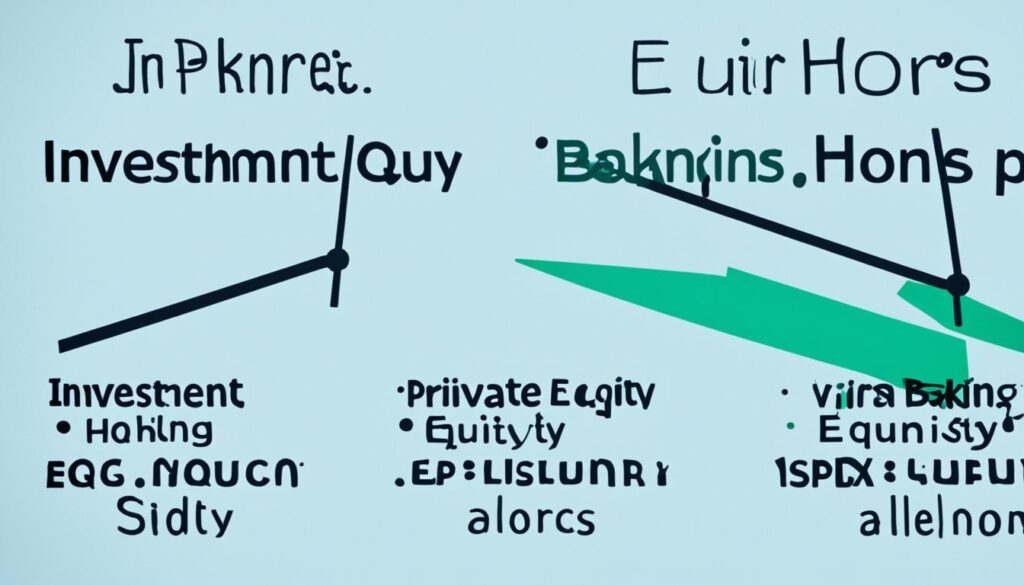Wondering about the work-life balance between venture capital (VC) and private equity (PE)? This is a hot topic for finance job seekers. Many weigh a good lifestyle highly in choosing their path in the finance industry1.
Is working in VC less hard than PE, though? Do the chances of big profits make up for long days and heavy workloads? In this piece, we’ll compare what it’s really like to work in VC versus PE. We’ll explore the job duties, hours, and the life of finance pros in these areas 2.
Key Takeaways
- Venture capital firms typically invest in early-stage, high-growth startups, while private equity firms focus on more mature companies.
- VC hours can vary significantly, with associates often facing intense periods during deal execution but generally enjoying a better work-life balance than their PE counterparts.
- VC compensation is lower than PE, with less consistent “carried interest” (a share of investment profits).
- The VC industry values individuals who are passionate about startups and can navigate both technical and market/customer aspects.
- Exploring alternative career paths, such as management consulting or the tech industry, can provide a better work-life balance compared to the demands of deal-driven finance roles.
Understanding the Workload in Private Equity
Working in private equity is tough because it demands a lot of your time. You might not work as many hours as those in investment banking. But, the workload is still hard 3. Associates in private equity work about 60-70 hours a week. During busy times with deals, this can go up to over 80 hours. Yet, they get to slow down sometimes, with only 50 hours of work some weeks 3.
Overview of Private Equity Hours
In private equity, how much you work varies. Associates typically work 60-70 hours half the time 3. Senior roles like principals or managing directors usually work 50 hours a week. But, if there’s a deal happening, their hours can increase 3. Surprisingly, those who move from investment banking to private equity find the work hours better3.
Distribution of Work Hours
What makes the workload in private equity heavy are activities like finding deals and examining them. Also, managing the businesses they invest in adds to the hours 4. Associates might find themselves working over 80 hours a week when it’s really busy, including weekends4. But, the amount of work can change depending on the firm’s size and how many deals they have on4. This irregular schedule can make it hard to keep a balance between work and personal life 4.
Private equity work-life balance is better than in investment banking but still challenging3. It’s different from management consulting where there’s a lot of travel. Instead, private equity means more time in the office and less away from home 3.
Even with the tough hours, private equity jobs are seen as very prestigious. They pay well and offer chances to grow in your career. After working in private equity, there are many different paths you can follow 3. This mix of high demands, good pay, and advancement opportunities attracts many people to finance jobs in private equity3.
Typical Tasks and Responsibilities in Private Equity

Private equity associates have a wide range of duties when they start. These include working on deals, managing companies the firm has invested in, and other tasks5.
Working on Transactions
About two-thirds of their time is spent on transactions. They look at new investment chances, check everything carefully, and make reports for meetings where decisions are made5. They are involved all the way from finding deals to making the final deal happen 5.
Managing Portfolio Companies
They also help the companies their firm has invested in. This often means helping with finance, going to important meetings, and working on specific projects 5. By doing this, they make sure these companies are doing well, which adds value and follows the firm’s investment plans5.
They spend the rest of their time, 5-10%, on various things. This includes figuring out the value of companies, looking for new investment opportunities, going to events, and helping raise money 5.
Private equity is full of diverse and intense tasks. This makes it both challenging and fulfilling, especially if you want a key role in finance5.
“Private equity professionals may spend about 3-4 hours on weekend work when in a moderate workload phase.”5
| Responsibility | Percentage of Time |
|---|---|
| Working on Transactions | ~66% |
| Managing Portfolio Companies | ~24-29% |
| Miscellaneous Tasks | 5-10% |
Are VC hours better than PE
The comparison between venture capital (VC) and private equity (PE) often centers on work-life balance. PE jobs are quite demanding, with workers often putting in 60 to 80 hours weekly6. In contrast, the VC world seems to provide a bit more breathing room, with hours totaling about 50 to 60 per week6.
But, the situation is not so simple. PE companies usually focus on mature businesses, buying into them heavily 6. On the other hand, VC firms put their money into newer, growing companies6. This different approach affects the day-to-day work and expectations.
| Metric | Private Equity | Venture Capital |
|---|---|---|
| Typical Investment Size | Around $100 million7 | About $5 million or higher7 |
| Industry Focus | Any industry7 | Technology, biotech, and clean technology7 |
| Work Hours per Week | 70 to 100 hours7 | 60 hours7 |
| First-Year Associate Salary | $200,000 – $300,0006 | 30-50% lower than PE6 |
| Junior Partner Salary | $400,000 – $600,0006 | $400,000 – $600,0007 |
Although VC work hours seem a bit lighter than PE’s, both demand a lot from their workers. The pay and effort required are high in both sectors. Venture capitalists might have it easier work-wise, but they must keep up with the fast pace and creativity of their field s6.
Choosing between PE and VC depends on what you value and your goals. Think about the unique challenges and rewards each offers. Make your decision based on what best fits your personal and professional dreams67.
The Demanding Nature of Deal-Oriented Jobs

Jobs focused on deals, like those in private equity, are very intense, especially when deals are happening. There is a lot of work to do, with decisions that can’t be changed and less oversight than in investment banking8. Because of this, private equity often has more stress even if the hours are sometimes better8.
Working on deals requires a lot of effort, as many have noted 8. If you’re in private equity, you might work 60 to 70 hours every week 8. Associates, for example, spend a lot of their time checking out companies, keeping an eye on ones they’ve already invested in, and doing other small tasks. Managing all of these tasks can be very challenging.
In private equity, the pay is slightly better than in investment banking, starting at about $100,0008. However, this job is less intense overall. You’ll usually have more free time and won’t have to work on weekends, unlike in investment banking8. But the stress can still be high because decisions are lasting and there’s not as much oversight8.
“The demands of deal-oriented jobs can be taxing, with a high level of focus and attention required to navigate complex transactions and manage portfolio companies effectively.”
Contrastingly, venture capital jobs can be more relaxed. People in this field often invest in about twenty to twenty-five companies 9. They might get a profit share of about 20%, like in USV, which means they earn money if the companies they invest in do well. Some firms, however, might have different profit-sharing models, like giving 25% or 30%9. This usually means less work stress than in private equity.
Working in areas like private equity is very challenging, demanding high levels of focus. While the hours might be better than in investment banking, it comes with its own kind of stress. This stress is because the decisions you make stick and there’s not much checking up on you. Knowing these things can help people choose their career paths wisely and consider how they want their work and life balance to be.
Comparing Investment Banking and Private Equity Hours

The gap in hours between investment banking (IB) and private equity (PE) might surprise you10. Though PE has shorter work hours, the demands are still high. This is true for both fields.
PE associates usually work 60-65 hours weekly10. In IB, it’s more, 80-85 hours10. But, weeks can stretch past 80 hours in both, especially during active deals11.
In PE, you’d do tasks like finding possible investments and managing companies10. In IB, it’s more about selling shares and helping with mergers and acquisitions (M&A)11. Both fields demand a lot, needing hard work and long hours.
| Metric | Investment Banking | Private Equity |
|---|---|---|
| Average Weekly Hours | 80-85 hours | 60-65 hours |
| Work-Life Balance | Highly demanding, with frequent 80+ hour weeks | Slightly more forgiving, but still intense during deals |
| Key Responsibilities | Placing shares, facilitating M&A deals (sell-side) | Screening investments, executing deals, managing portfolio companies (buy-side) |
| Regulatory Environment | Heavily regulated since the Gramm-Leach-Bliley Act and Dodd-Frank Act | Historically faced lighter regulations compared to banks and public companies |
PE may seem to have a lighter workload than IB11. But, balancing life with work is tough in both careers10. Employees in both must commit fully, often giving up personal time.
The choice between IB and PE relies on what you value most. Each offers chances to grow your career and earn money. But, you’ll need to think about the impact on your time and life1011.
The Role of Experience in Reducing Work Hours

Private equity pros see less work hours as they get more experience12. Starting off, they work 60-110 hours a week. But, by the time they’re mid-level or partners, their hours drop by 5-10 hours a week12. Why? More senior staff passes on work to the team. This means doing less hands-on and more big-picture work, like finding new deals and running the firm12.
Partners in private equity usually work 40-50 hours a week12. Yet, more travel might make up for this time off12. This can make work-life balance better in PE and help keep the best workers in the field.
The work life of partners may seem easier than that of newbies, but it’s not simple. They do less day-to-day work and focus more on big decisions, building relationships, and managing the company12. While it may bring a nicer work-life balance, it needs strong leadership and decision skills.
“The increased travel requirements at higher levels, however, can offset some of these hours reductions.”
In the end, as these experts grow, their work weeks get shorter. Yet, their jobs change too, focusing on bigger decisions and less on daily tasks. This is important for anyone thinking about a PE career or already in it12.
Venture Capital: A Closer Look at the Work Culture

Exploring the venture capital sector, we see it’s different from private equity (PE). VC and PE both invest and make deals. But VC offers a more balanced work life. Choosing a career in venture capital means considering a culture with unique benefits.
Typical Responsibilities in Venture Capital
VC associates handle various duties. This includes finding new investment chances, doing deep research, and helping grow their invested companies13. They work closely with startup teams, offering advice and support. The work is busy but often more flexible than PE’s intense pace13.
Advantages of Venture Capital Over Private Equity
In venture capital, the payoff could be big. You get to work with companies that are innovating fast. VC roles may lead to good financial returns. They also tend to have a more flexible culture and a better balance between work and life13.
“The winners in private equity and venture capital will be determined by their ability to excel in buying and building, creating value, and being smarter and better than competitors.”13
Venture capital funds go beyond money. They bring tech know-how and management skills to help startups grow13. This support can set them up for success.
Balancing Workload and Career Aspirations

Thinking about working in fields like private equity or venture capital is a serious business. It’s vital to think about how much work you’ll need to do compared to your dreams. While private equity might let you have a bit more time for yourself than investment banking, the job itself can still be very intense14.
If you’re choosing between venture capital (VC) and private equity (PE), think about more than just the hours. Think about the company culture, chances for growth, and how happy you’ll be with the job. Finding the middle ground between reaching your career goals and taking care of yourself is crucial for those looking to be successful in finance and investment14.
- Planning your important tasks for the week ahead on Sundays may lead to a successful start in the venture capital world14.
- Spending time to map out your work can help you keep yearly and quarterly goals in sight in venture capital14.
- It’s vital to set limits on your work hours to keep a healthy work-life balance14.
- Sharing tasks with others effectively can make your work and personal life blend better in venture capital14.
- Tools that can automate tasks and make processes smoother save you time and lower your workload in venture capital14.
- Regularly taking breaks and recharging are necessary to avoid getting too stressed and keep your mind and body healthy in VC14.
If you’re looking into other paths, know that many investment bankers move into private equity jobs. Those from investment banking also look for roles in growth equity. Companies like Apple, Google, Facebook, and Microsoft are quite appealing to some former bankers15. Venture capital firms like hiring people with investment banking experiences. Hedge funds are an unusual but interesting route as well15.
“Striking the right balance between professional success and personal well-being is a key consideration for aspiring finance and investment professionals.”
Exploring Alternative Career Paths

Looking for a job with better hours than private equity or venture capital? Consider alternative paths16. Working for management consulting firms means a more balanced life, especially for new employees16. The tech industry is also an option. It offers a fast-paced environment for those interested in finance and business.
Management Consulting Firms
Management consulting firms have a tough work culture but offer a fair work-life balance16. Financial analysts make about $108,790 a year when they start16. Even though work is hard, firms tend to have set hours. They also focus on balancing work with personal life, especially for newbies.
Tech Industry Opportunities
If you’re into finance and business, the tech industry is an exciting path. It’s known for being quick-paced16. VC analysts make around $111,000 annually, which is close to the $112,200 PE analysts earn16. Tech companies usually value work-life balance. They offer flexible schedules and chances to grow in your career.
Looking for a change or a more balanced life? These alternative career options are great if you’re in finance or business. They help you escape the long hours of private equity and venture capital. You might find a path that’s rewarding and better fits your lifestyle.
Conclusion
Looking at venture capital (VC) and private equity (PE) hours is more complicated than choosing one. While PE offers a little better work hours than banking, the job demands in PE and VC are still tough.
Work-life balance varies based on your role, company size, and how you approach work. As you plan your finance career, it’s important to know what you want. Think about how hard you’re willing to work and what lifestyle you prefer17.
The differences between VC and PE hours and their impacts on your life are clear. Both jobs need a lot of dedication, especially early in your career. Choosing between VC and PE depends on what you value and if you can do well in a demanding job18.
FAQ
Are VC hours better than PE hours?
What is the typical workload in private equity?
What are the main responsibilities of private equity associates?
How do the work cultures and responsibilities differ between VC and PE?
Why are deal-oriented jobs so demanding?
How do the hours in private equity compare to investment banking?
How do work hours change with seniority in private equity?
What are the alternative career paths for those concerned about work-life balance in finance?
Source Links
- https://mergersandinquisitions.com/venture-capital-careers/ – Venture Capital Careers: Work, Salary, Bonuses and Exits
- https://growthequityinterviewguide.com/growth-equity-hours – Growth Equity Hours: Culture, Lifestyle, & Work Life Balance
- https://growthequityinterviewguide.com/private-equity-hours – Private Equity Hours: Inside The 60/70 Hour Workweek
- https://blog.privateequitylist.com/private-equity-hours-how-many-hours-do-private-equity-associates-work/ – Private Equity Hours: How Many Hours Do Private Equity Associates Work?
- https://www.peakframeworks.com/post/private-equity-hours – Private Equity Hours (60-70 Hour Work Weeks)
- https://www.fe.training/free-resources/careers-in-finance/private-equity-vs-venture-capital/ – Private Equity vs Venture Capital – Financial Edge
- https://www.mbacrystalball.com/blog/2019/02/06/private-equity-vs-venture-capital-vs-hedge-funds/ – Private equity vs venture capital vs hedge funds: Career choice – MBA Crystal Ball
- https://www.wallstreetoasis.com/forum/private-equity/pe-lifestyle-hours-weekends-base-bonus-etc – PE lifestyle? Hours, weekends, base, bonus, etc.?
- https://avc.com/2016/02/fund-level-vs-deal-by-deal-carry/ – Fund Level Vs Deal By Deal Carry
- https://mergersandinquisitions.com/investment-banking-vs-private-equity/ – Investment Banking vs Private Equity: Full Comparison and Advice
- https://www.investopedia.com/ask/answers/041315/what-are-major-differences-between-investment-banking-and-private-equity.asp – Investment Banking vs. Private Equity: What’s the Difference?
- https://www.buysidehustle.com/work-life-balance-in-finance-ranked-best-to-worst/ – Work-Life Balance In Finance Ranked – Best to Worst – Buyside Hustle
- https://www.linkedin.com/pulse/private-equity-vs-venture-capital-what-better-fit-you-tommy-kim – Private Equity vs. Venture Capital: What is a Better Fit For You?
- https://www.linkedin.com/advice/1/what-most-effective-work-life-balance-strategies-ql4bc – What are the most effective work-life balance strategies for Venture Capitalists on the go?
- https://growthequityinterviewguide.com/investment-banking-exit-opportunities – Investment Banking Exit Opportunities: An In-Depth Profile
- https://www.theforage.com/blog/careers/private-equity-vs-venture-capital – Private Equity vs. Venture Capital: What’s the Difference?
- https://medium.com/indicator-ventures/vc-versus-mc-the-ten-major-differences-between-venture-capital-and-management-consulting-af113c8ccb90 – VC versus MC: the ten major differences between venture capital and management consulting
- https://www.nexea.co/the-difference-between-private-equity-and-venture-capital/ – The Difference between Private Equity and Venture Capital — NEXEA
